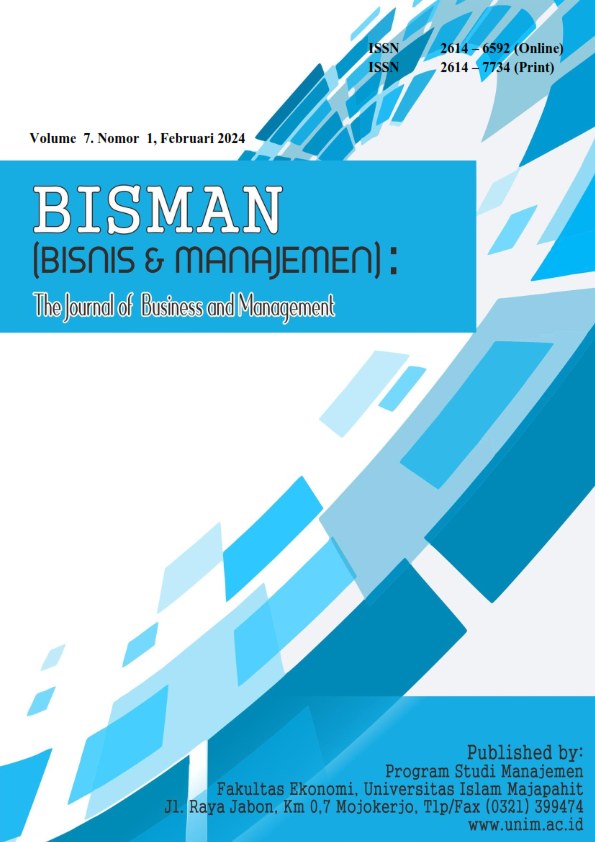Increasing Green Economic Growth Through Education and Income Levels
DOI:
https://doi.org/10.36815/bisman.v7i1.3188Keywords:
green economic growth, community income, education, government programsAbstract
Green economic growth can have a negative impact on poor communities. The green economic transition can cause an increase in energy prices which can have a negative impact on poor communities. The green economic transition can cause job losses, especially for sectors whose supporting materials depend on intensive natural resources. This research aims to analyze the influence of poor people's income with the independent variables being the level of income and education on the affected green economists. This research uses primary data and secondary data. The research results show that people's income has a negative influence on the impact of the green economy. An increase in people's income can reduce the negative impact of the green economy. Education has a positive effect on increasing the growth and sustainability of the green economist program in the Jepara region.
References
Digital, E. and Aksi, M. (2021) ‘DIKLUS?: Jurnal Pendidikan Luar Sekolah Systematic Review?: Strategi Pemberdayaan Pelaku UMKM Menuju Systematic Review?: Strategies for Empowering UMKM Subject Toward a’, 1, pp. 1–13.
Dira, A.F. et al. (2023) ‘Pengaruh Investasi dan IPM terhadap Pertumbuhan Ekonomi Hijau di Provinsi Kalimantan Timur’, 11(2), pp. 1437–1446.
Fitrianti, A.A. (2022) ‘Perencanaan Pembangunan Infrastruktur Perdesaan?: Kajian Pustaka Terstruktur’, 6(1), pp. 47–64.
Hamenda, B. et al. (2022) ‘STUDI LITERATUR PENGARUH PENDIDIKAN EKONOMI DI LIKUPANG’, 1, pp. 24–31.
Hardianto, H. and Desa, A.D. (2022) ‘DETERMINASI PEMBERDAYAAN MASYARAKAT DAN PEMBERANTASAN KEMISKINAN DESA?: ANALISIS DANA DESA DAN ALOKASI DANA DESA ( LITERATURE REVIEW MANAJEMEN KEUANGAN )’, 3(1), pp. 266–275.
Hasanah, A.S., Hindrayani, A. and Noviani, L. (2023) ‘Pengaruh Sikap dan Sensitivitas Harga Mahasiswa Pendidikan Ekonomi Terhadap Keputusan Pembelian Produk Hijau’, 05(04), pp. 16821–16833.
Ihsani, S.F. (2022) ‘Jurnal Ekonomi-Qu Distribusi Pendapatan dan Kemiskinan di Indonesia?: Kasus Kebijakan Sentralisasi , Desentralisasi , dan Pandemi Covid-19’, (2021).
Jaya, R. and Fitria, E. (2021) ‘Review Manajemen Rantai Pasok Produk Pertanian Berkelanjutan?: Konseptual , Isu Terkini , dan Penelitian Mendatang ( A Review of Sustainable Agric-Supply Chain Management?: Conceptual , Current Issue , and Future Research )’, 26(1), pp. 78–91. Available at: https://doi.org/10.18343/jipi.26.1.78.
Khaidir, M., Harahap, R. and Rakhmawan, S.A. (2023) ‘From Micro to Green Macro?: Exploring Technology Adoption and Sustainable Growth in West Java ’ s MSMEs’, pp. 1–18.
Kurniawati, K.D. (2022) ‘Inklusivitas Bantuan Sosial Lanjut Usia di Negara Berpendapatan Menengah Atas?: Studi pada Afrika Selatan , Brazil , China , dan Indonesia’, 3(1), pp. 41–55.
Literatur, S.T. (2021) ‘Jurnal Ilmiah Administrasi Publik ( JIAP )’, 7(2), pp. 290–305.
Mb, W.W., Tang, J. and Wei, F. (2020) ‘Updated understanding of the outbreak of 2019 novel coronavirus ( 2019 ? nCoV ) in Wuhan , China’, (January), pp. 441–447. Available at: https://doi.org/10.1002/jmv.25689.
Nasution, M. (no date) ‘POTENSI DAN TANTANGAN BLUE ECONOMY DALAM MENDUKUNG PERTUMBUHAN EKONOMI DI INDONESIA?: KAJIAN LITERATUR THE POTENTIAL AND CHALLENGES OF THE BLUE ECONOMY IN SUPPORTING’, 7, pp. 340–363.
Panayotou, T. (1993) Empirical Tests and Policy Analysis of Environmental Degradation at Different Stages of Economic Development by.
Rasdi, D. (2020) ‘EFEKTIVITAS KEMITRAAN PEMERINTAH DAN SWASTA DALAM UPAYA PENANGGULANGAN KEMISKINAN?: SEBUAH TINJAUAN LITERATUR DALAM UPAYA PENANGGULANGAN KEMISKINAN?: EFFECTIVENESS OF PUBLIC-PRIVATE PARTNERSHIP IN THE POVERTY REDUCTION?: A LITERATURE STUDIES Teguh Kurniawan Abstrak’, (May 2019). Available at: https://doi.org/10.33007/inf.v5i2.1728.
Review, D. (1991) ‘Review Reviewed Work ( s ): The Population Explosion . by Paul R . Ehrlich and Anne H . Ehrlich Review by?: Thomas J . Espenshade Source?: Population and Development Review , Jun ., 1991 , Vol . 17 , No . 2 ( Jun ., 1991 ), pp . Published by?: Population Council Stable URL?: https://www.jstor.org/stable/1973735’, 17(2), pp. 331–339.
Romli, M. (2021) ‘31 (2): 129-142 ’, 31(2), pp. 129–142.
Saputra, F. and Ali, H. (2022) ‘PENERAPAN MANAJEMEN POAC?: PEMULIHAN EKONOMI SERTA KETAHANAN NASIONAL PADA MASA PANDEMI COVID-19 ( LITERATURE REVIEW MANAJEMEN POAC )’, 3(3), pp. 316–328.
Widyastuti, S., Pancasila, U. and Berkelanjutan, P. (2019) ‘SEBUAH SINTESIS PADA LITERATUR?: STRATEGI INTERVENSI PEMASARAN HIJAU MENUJU PEMBANGUNAN BERKELANJUTAN ( A Synthesis of Literature?: A Green Marketing Intervention Strategy towards Sustainable Development )’, 2(April), pp. 83–94.
Downloads
Published
Issue
Section
License
Copyright (c) 2024 Bisman (Bisnis dan Manajemen): The Journal of Business and Management

This work is licensed under a Creative Commons Attribution-NonCommercial 4.0 International License.
Pemberitahuan Hak Cipta
- Seluruh materi yang terdapat dalam situs ini dilindungi oleh undang-undang. Dilarang mengutip sebagian atau seluruh isi situs web ini untuk keperluan komersil tanpa persetujuan dewan penyunting jurnal ini.
- Apabila anda menemukan satu atau beberapa artikel yang terdapat dalam Bisman (Bisnis dan Manajemen): The Journal of Business and Management yang melanggar atau berpotensi melanggar hak cipta yang anda miliki, silahkan laporkan kepada kami, melalui email pada Priciple Contact.
- Semua Informasi yang terdapat di Bisman (Bisnis dan Manajemen): The Journal of Business and Management bersifat akademik. Bisman (Bisnis dan Manajemen): The Journal of Business and Management tidak bertanggung jawab terhadap kerugian yang terjadi karana penyalah gunaan informasi dari situs ini.





